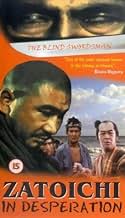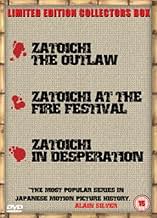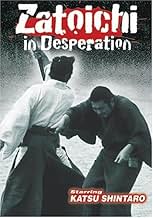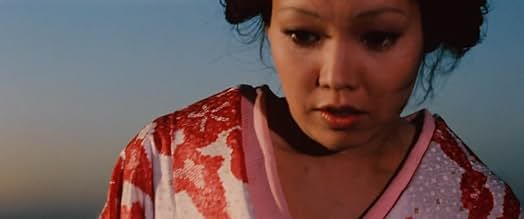La Légende de Zatoïchi : La blessure
Original title: Shin Zatôichi monogatari: Oreta tsue
IMDb RATING
6.8/10
1.2K
YOUR RATING
After accidentally causing an old lady's death, Zatoichi seeks out her daughter to atone for the tragedy, consequently getting into all sorts of trouble.After accidentally causing an old lady's death, Zatoichi seeks out her daughter to atone for the tragedy, consequently getting into all sorts of trouble.After accidentally causing an old lady's death, Zatoichi seeks out her daughter to atone for the tragedy, consequently getting into all sorts of trouble.
- Director
- Writers
- Stars
- Director
- Writers
- All cast & crew
- Production, box office & more at IMDbPro
Featured reviews
Katsu Productions was at a high level of output at this time. Katsu was producing the Zatoichi series, the Lone Wolf series, the Hanzo the Razor trilogy, the Mute Samurai television series and the Lone Wolf television series. All within a span of two years. In addition to acting in several of these efforts (of course) he also took the director's chair on several occasions. This man had a lot of energy.
While sometimes actors who take the helm show a lack of concern with the visuals preferring to focus on the performances, Katsu is an exception. The visual style here is unlike any other Zatoichi I've seen and in fact unlike most other chambara films. Everything is shot in deep focus with moody lighting and stark saturated colors. The style is somber and depressing. The next (and last in the series) Zatoichi film is back to the standard look. If you like this film I would suggest looking into Katsu's Oshi Samurai series which continues the atmosphere.
One of the best Zatoichi films but not similar to the others. Recommended but prepare for a somber experience.
While sometimes actors who take the helm show a lack of concern with the visuals preferring to focus on the performances, Katsu is an exception. The visual style here is unlike any other Zatoichi I've seen and in fact unlike most other chambara films. Everything is shot in deep focus with moody lighting and stark saturated colors. The style is somber and depressing. The next (and last in the series) Zatoichi film is back to the standard look. If you like this film I would suggest looking into Katsu's Oshi Samurai series which continues the atmosphere.
One of the best Zatoichi films but not similar to the others. Recommended but prepare for a somber experience.
It started up well, yet, at a certain point the script turned to a level of imbecility comparable with a big studio US creation. Well, compared with the level of the US Academy this can easily can take an Oscar for best script.
On the other hand this movie achieves something almost unique. The visual style is so unusual (especially for somebody used with the standard blockbuster) that both makes the film unforgettable and hard to watch. In my opinion this is what Mean Streets and The Killing of a Chinese Bookie should have looked like if the tech team involved would have been skilled enough. The gambling scene alone makes Rounders look like a half baked high-school project (which is not far from the truth anyway).
A 6 for cramming so much into this movie. You have a social message, the indolence of the rich (the young watching the fishermen's boats burn), the unromaticised noblemen, etc.
Contact me with Questions, Comments or Suggestions ryitfork @ bitmail.ch
On the other hand this movie achieves something almost unique. The visual style is so unusual (especially for somebody used with the standard blockbuster) that both makes the film unforgettable and hard to watch. In my opinion this is what Mean Streets and The Killing of a Chinese Bookie should have looked like if the tech team involved would have been skilled enough. The gambling scene alone makes Rounders look like a half baked high-school project (which is not far from the truth anyway).
A 6 for cramming so much into this movie. You have a social message, the indolence of the rich (the young watching the fishermen's boats burn), the unromaticised noblemen, etc.
Contact me with Questions, Comments or Suggestions ryitfork @ bitmail.ch
I have not seen more than five of the classic (and undeniably classy) Zatoichi samurai films, but this is surely the best, cinematographically, so far. It;s hard to believe this was shot in Eastman Color, a kind of poor second to Technicolor (and with far less durability; either the negative was especially preserved, or digital restoration was performed by a true expert; but in any event, this film is absolutely gorgeous to look at.
The story is dark, as others have noted; but the Zatoichi series, like most of the sword-fight genre series films to come out of Japan, is pretty heavy-handed stuff; the Japanese seem to take this sort of thing very seriously. Yet there is no doubt Zatoichi "24" stands out as exceptional, from both the series and its genre. The reason, I think, is its almost total sense of social dislocation; Zatoichi is treated by the other characters as somehow less than human, and his determination to fight at the end somewhat more than human, and so he comes across as something other than human; but the other humans of the film come across as rather poor representatives of the species. I should note that there is very little dialog in this film, particularly at the most dramatic moments, which heightens our sense that we are watching some tragedy from another reality.
The question here is, has director/star Katsu pushed his character to such an extreme that he is no longer representative of his genre, but somehow an independent dramatic entity, a "grade-A film", as might be enjoyed by those who disdain genre-films? well, I suggest this film to such viewers, as the "one chambara (Japanese sword-fight)film to see". But in any event, it is an exceptional, and troubling, cinema experience for anyone.
The story is dark, as others have noted; but the Zatoichi series, like most of the sword-fight genre series films to come out of Japan, is pretty heavy-handed stuff; the Japanese seem to take this sort of thing very seriously. Yet there is no doubt Zatoichi "24" stands out as exceptional, from both the series and its genre. The reason, I think, is its almost total sense of social dislocation; Zatoichi is treated by the other characters as somehow less than human, and his determination to fight at the end somewhat more than human, and so he comes across as something other than human; but the other humans of the film come across as rather poor representatives of the species. I should note that there is very little dialog in this film, particularly at the most dramatic moments, which heightens our sense that we are watching some tragedy from another reality.
The question here is, has director/star Katsu pushed his character to such an extreme that he is no longer representative of his genre, but somehow an independent dramatic entity, a "grade-A film", as might be enjoyed by those who disdain genre-films? well, I suggest this film to such viewers, as the "one chambara (Japanese sword-fight)film to see". But in any event, it is an exceptional, and troubling, cinema experience for anyone.
The following review is an extract from the book "Shintaro Katsu´s Zatoichi: Complete guide to all movies", which is now available on Amazon.
Zatoichi crosses a bridge with a woman who plays the shamisen. The old woman warns him to be careful, for the wood of the bridge has holes, and it is easy to fall if one does not pay attention. The two talk briefly, and the lady asks the blind man where he is going. "Nowhere in particular, wherever the wind takes me", replies the wandering masseur. The old woman replies that she intends to visit her daughter, who works in a geisha house called Ogiya in a nearby town. Moments after they have said goodbye, the blind man has the idea of offering some coins to the old woman, as a tip for playing the shamisen so well... The grateful woman is about to take the coins, but distracted by the surprising gift, slips, loses her balance and falls into the void... She, who had recommended to the blind man to be very careful.
Zatoichi feels guilty for the deadly accident of the poor woman. Unlike its owner, the instrument has remained on the bridge and the masseur picks it up. With the shamisen he walks towards the city of which the deceased spoke to him, to look for his daughter, the geisha, in Ogiya.
(...)
This, the 24th and penultimate, is one of the two films in the saga directed by actor Shintaro Katsu himself, who also acted as co-producer. The other, also directed by Katsu, is the last of the originals (called "Zatoichi" just like that), which was filmed many years later - in 1989 - and where you can see an already grayed and almost old Ichi.
"Zatoichi in desperation", as its title already indicates, is fraught with deep pessimism. Oppressive and dark, sad, depressing and hopeless. Tragically and emotionally brutal.
It also has an undeniable poetic undertone.
Zatoichi crosses a bridge with a woman who plays the shamisen. The old woman warns him to be careful, for the wood of the bridge has holes, and it is easy to fall if one does not pay attention. The two talk briefly, and the lady asks the blind man where he is going. "Nowhere in particular, wherever the wind takes me", replies the wandering masseur. The old woman replies that she intends to visit her daughter, who works in a geisha house called Ogiya in a nearby town. Moments after they have said goodbye, the blind man has the idea of offering some coins to the old woman, as a tip for playing the shamisen so well... The grateful woman is about to take the coins, but distracted by the surprising gift, slips, loses her balance and falls into the void... She, who had recommended to the blind man to be very careful.
Zatoichi feels guilty for the deadly accident of the poor woman. Unlike its owner, the instrument has remained on the bridge and the masseur picks it up. With the shamisen he walks towards the city of which the deceased spoke to him, to look for his daughter, the geisha, in Ogiya.
(...)
This, the 24th and penultimate, is one of the two films in the saga directed by actor Shintaro Katsu himself, who also acted as co-producer. The other, also directed by Katsu, is the last of the originals (called "Zatoichi" just like that), which was filmed many years later - in 1989 - and where you can see an already grayed and almost old Ichi.
"Zatoichi in desperation", as its title already indicates, is fraught with deep pessimism. Oppressive and dark, sad, depressing and hopeless. Tragically and emotionally brutal.
It also has an undeniable poetic undertone.
I am new to the Zatoichi film series; this was the first film in the series I have seen, after buying a couple of seasons of the TV series and enjoying them. If the rest of the series is as good as this one then I can see I am in for a virtual lifetime of great Zatoichi films - when I can find them in video stores!
"Zatoichi in Desperation" is darker and as another reviewer said, more "heavy handed" than the TV episodes I have seen. The characters - the prostitute given a tentative freedom, the fishermen from the village harassed by the local yakuza gang, the 14-year-old girl about to be forced to work in the brothel and her little brother - are memorable and tragic. Their lives become intertwined with Zatoichi's by a twist of fate - an old woman who accidentally falls from a bridge, and Zatoichi's guilt resulting over it.
This intertwining of relationships, Zatoichi's humbleness despite his master swordsmanship, and the great photography is what makes the film (and the Zatoichi series!) special.
"Zatoichi in Desperation" is darker and as another reviewer said, more "heavy handed" than the TV episodes I have seen. The characters - the prostitute given a tentative freedom, the fishermen from the village harassed by the local yakuza gang, the 14-year-old girl about to be forced to work in the brothel and her little brother - are memorable and tragic. Their lives become intertwined with Zatoichi's by a twist of fate - an old woman who accidentally falls from a bridge, and Zatoichi's guilt resulting over it.
This intertwining of relationships, Zatoichi's humbleness despite his master swordsmanship, and the great photography is what makes the film (and the Zatoichi series!) special.
Did you know
- TriviaOnly film in the original series directed by Zatoichi himself, Shintarô Katsu. He would go on to direct one more, La légende de Zatoïchi - L'odyssée finale (1989).
- Quotes
Boss Mangoro Kagiya: Please enjoy watching as Zatoichi meets his end.
- ConnectionsFollowed by Mang jian xue di zi (1973)
- How long is Zatoichi in Desperation?Powered by Alexa
Details
- Release date
- Country of origin
- Language
- Also known as
- Zatoichi in Desperation
- Production companies
- See more company credits at IMDbPro
- Runtime1 hour 35 minutes
- Sound mix
- Aspect ratio
- 2.35 : 1
Contribute to this page
Suggest an edit or add missing content

Top Gap
By what name was La Légende de Zatoïchi : La blessure (1972) officially released in India in English?
Answer





























